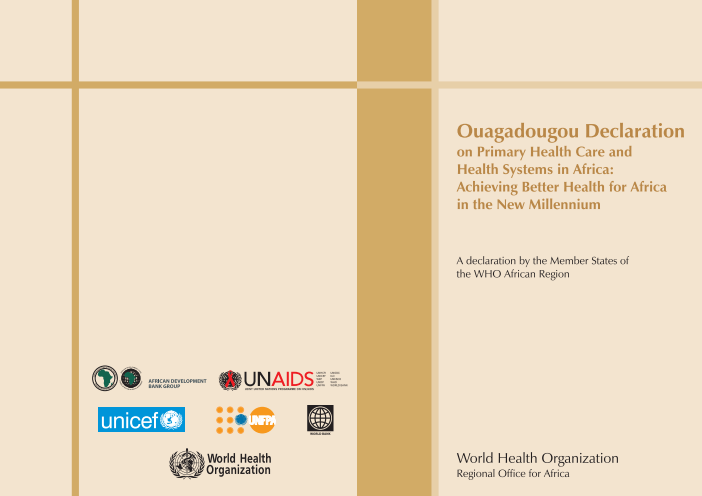
Ouagadougou Declaration on Primary Health Care and Health Systems in Africa
The Ouagadougou Declaration on Primary Health Care and Health Systems in Africa focuses on nine major priority areas, namely:
- Leadership and Governance for Health;
- Health Service Delivery;
- Human Resources for Health;
- Health Financing;
- Health Information Systems;
- Health Technologies;
- Community Ownership and Participation;
- Partnerships for Health Development; and
- Research for Health.
For each of these priority areas, this Implementation Framework proposes recommendations for consideration by Member States in the development of their own country frameworks, except for Health Information and Research for Health which have been taken into account in the Algiers Framework.
Among the recommendations for strengthening leadership and governance for health are institutionalizing intersectoral action for improving health determinants; updating comprehensive national health policy in line with the Primary Health Care (PHC) approach and other regional strategies; updating the national health strategic plan to ensure integrated management; and providing comprehensive essential health services.
To improve the effectiveness of health service delivery, countries should provide comprehensive, integrated, appropriate and effective essential health services, design their models of delivery and estimate costs; and ensure service organization and stakeholder coordination to promote and improve efficiency and equity.
To improve human resources for health (HRH), countries should develop comprehensive evidence-based health workforce planning and monitoring; build health training institutions' capacity for scaling up the training of relevant cadres of health-care providers; promote strategies for motivation and retention of HRH; build HRH management and leadership capacity; and mobilize resources for HRH development.
To improve health financing, countries should develop comprehensive health financing policies and plans; institutionalize national health accounts and efficiency monitoring; strengthen financial management skills at all levels; and implement the Paris Declaration on Aid Effectiveness.
In relation to health technologies, countries should increase access to quality and safe health technologies; develop national policies and plans on health technologies; develop norms and standards for the selection, use and management of appropriate health technologies; and institute a transparent and reliable system for the procurement of health technologies.
For effective community ownership and participation in health development, it is essential to create an enabling policy framework for community participation; build community capacity; reorient the health service delivery system to improve community access and utilization; and use health promotion strategies to empower communities to adopt healthier lifestyles.
To strengthen partnerships for health development, countries may use mechanisms such as the International Health Partnership Plus (IHP+) and the Harmonization for Health in Africa initiatives to promote harmonization and alignment in line with the PHC approach; and adopt intersectoral collaboration, public-private partnerships and civil society participation in policy formulation and service delivery.
Countries are advised to adapt and apply this Implementation Framework to their own specific situation, taking into account the progress made and the actions that need to be undertaken to achieve the Millennium Development Goals and related targets, for better and more equitable health outcomes.


